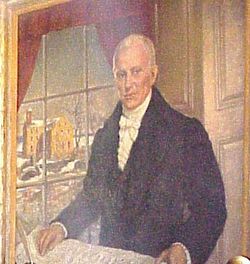Think of this as Volume 15, Number 24 of A-Clue.com, the online newsletter I've written since 1997. Enjoy.

They are only valuable if they are exploited. You can only get value from them if you pursue an idea to a completed work or invention, or if you get so good at coming up with new ideas people who do scale works or invention will pay you to supply them.
Patent and copyright were first created as “monopolies” in our 1787 Constitution, but they did not become enforced until the late 19th century, after the U.S. gained a positive balance-of-trade in the products of ideas – in books and inventions.
When countries like China and India choose to ignore our copyright and patent laws, they are walking in the foodsteps of people like Samuel Slater (right), the people whose inventiveness built this country. Slater copied his 1793 Rhode Island mill from one he'd worked at in England, in violation of English law. Eli Whitney never made money from his cotton gin – his money came from a gun made with interchangeable parts he was able to manufacture.
Even when copyright and patent rights are fully maintained, most of the money they generate does not go to the people who came up with the ideas. In fact, very little does. A singer or author may only earn a 15% royalty. Royalties on patents are even more modest.
So why has the United States become such a stickler on patent and copyright, to the point where the government is willing to call Google an outlaw in order to enforce these laws more rigorously?

This is why many artists and scientists are now against expansion of our “intellectual property” laws, even though this may cost them money. We know who benefits, and who doesn't.
When our patent laws were first created, a 14-year term seemed reasonable, because it might take that long to exploit the market created by the invention through manufacturing and marketing. Today such exploitation can happen within a year, and many high tech markets are dead long before patents expire. What really matters is scaling production, scaling marketing, the blocking-and-tackling of business. An invention is really no protection at all to today's inventor.

Big corporations use patents similarly. They patent as much as they're able, they create huge stacks of patents, and they use this in corporate warfare, either against other corporations or to prevent new competitors from entering the market.
That's not the way our law is supposed to work. Patents and copyrights are enumerated in the rights given to the Congress:
To promote the Progress of Science and useful Arts, by securing for limited Times to Authors and Inventors the exclusive Right to their respective Writings and Discoveries;
I've highlighted what is most important. If a patent or copyright does not promote the progress of science and the useful arts, if it is given for an unlimited time, if it's not an individual right, it's clearly not within the “intent of the Founders” so beloved of conservative jurisprudence.
Yet look at what is happening. Copyrights have been extended to damned-near forever, and there are active moves afoot to destroy the public domain entirely , and create eternal copyrights. Patents are actively being used to destroy Google's Android, a Linux, while law firms are shaking down small companies for using rights licensed to Apple by these same patent holders.
The law, in other words, is working against the interests of inventors, against the interests of authors and artists, because it is working on behalf of the large corporate interests controlling the government through campaign donations.
In my studies of American history I have seen the same patterns repeat. There is a political pattern where a set of beliefs is accepted, becomes entrenched, finds opposition, and then breaks through in an excess that makes no sense. And there is a longer economic pattern, in which industries go through the same process, only over longer periods.
Notice the pattern:
-
Slavery, as an economic concept, became vital to the South only after the year 1800, and lasted two generations before a Civil War was required to end it.
-
Similarly, railroads rose during the Jackson Administration and ruled our economy for two generations, before the Progressive movement put limits on utilities around 1900.
-
Industrial manufacturers that arose in the 1860s controlled the economy for two generations until the Great Depression showed that mass production without mass consumption equals poverty.
-
Branded product manufacturing, which first arose in the early Progressive era, held sway for two generations until the 1960s, after which it gradually became the Rust Belt.
-
And mass communication, which arose around the time of the Depression with radio and movies, is now firmly in charge of our laws, after two generations. But the Internet industry demands that those laws change.

Expanding copyright and patent rights at this point only benefits a small handful of companies that are no longer interested in competing in the marketplace, but in clipping patent and copyright coupons. We will grow faster if we rationalize these laws.
The alternative is to let countries that freely ignore those laws, countries like China and India that are playing the 1793 game, dominate our future.
In the end, you can't stop ideas from spreading. You never could. As technology improves they just spread faster, no matter what you do. We need to be on the side of enabling that spread, not trying to stop it.
Or the same forces that created us will bury us.
As they're burying us right now.












Rumah Dijual Di Bekasi
Rumah 2 Lantai Dijual di Bekasi Alamat: Jl. Nusa Indah 2 No. 206 RT. 08/ RW. 08 Perumnas 1 Bekasi Harga: Rp. 600.000.000 (Nego) Luas Tanah 90 M2 Luas bangunan 180 M2 4 Kamr tidur, 2 kamar Mandi, Listrik 1300 Watt …
House Property Managing Likely to Appropriate Supervising
Prop asset operations is a component involving advantage direction as well as includes home choice, this effectuation of guidelines and performance requirements to the said property, as well as the appropriate keeping track of the propertys func…